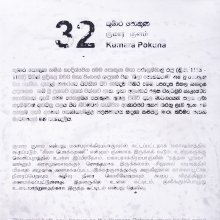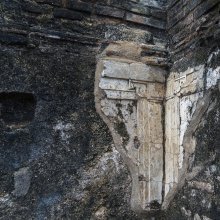Mahavamsa, Mahāvaṃśa, Mahāvaṃsa, Mahavamsha, Mahāvamsa, Maha-vamsha: 5 definitions
Introduction:
Mahavamsa means something in Buddhism, Pali, Hinduism, Sanskrit, the history of ancient India. If you want to know the exact meaning, history, etymology or English translation of this term then check out the descriptions on this page. Add your comment or reference to a book if you want to contribute to this summary article.
The Sanskrit term Mahāvaṃśa can be transliterated into English as Mahavamsa or Mahavamsha, using the IAST transliteration scheme (?).
Images (photo gallery)
(+5 more images available)
In Buddhism
Theravada (major branch of Buddhism)
Source: Pali Kanon: Pali Proper NamesMahavamsa Mahavamsa
The great Chronicle of Ceylon. The first part of the work - i.e., to the time of King Mahasena - is attributed to Mahanama Thera (MT.687). The continuation of the Chronicle is called the Culavamsa. The first portion of the Culavamsa - i.e., from Mahasena to the reign of Parakkamabahu II. - is traditionally ascribed to a thera named Dhammarakkhita (Cv. Trs.ii.155, n.3). The next section - i.e., to the time of Kittisiri Rajasiha - was written by Tibbatuvave Thera, Mahanayaka of Puppharama, at the invitation of the king, who obtained for him copies of the Chronicle from Siam (Cv.xcix.78f; Cv.Trs.ii.263, n.1). From there it was continued till the time of the British occupation (1815 A.C.) by Hikkaduve Sumangala Thera (P.L.C.310).
There is a Commentary on the Mahavamsa called the Vamsatthappakasini (q.v.).
Theravāda is a major branch of Buddhism having the the Pali canon (tipitaka) as their canonical literature, which includes the vinaya-pitaka (monastic rules), the sutta-pitaka (Buddhist sermons) and the abhidhamma-pitaka (philosophy and psychology).
General definition (in Buddhism)
Source: WikiPedia: BuddhismThe Mahavamsa is a historical poem written in the Pali language, of the Kings of Sri Lanka. The first version of it covered the period from the coming of King Vijaya of the Rarh region of ancient Bengal in 543 BCE to the reign of King Mahasena (334–361).
etymology: Mahavamsa (Sinhala: මහාවංසය [ˈmahavaŋʃəyə]; Pali: Mahāvaṃsa, trans. "Great Chronicle"; abbrev. Mhv. or Mhvs.)
India history and geography
Source: academia.edu: The Chronological History of Ancient Sri LankaMahavamsa and Dipavamsa relate the chronological history of Sri Lanka from the epoch of Theravada Buddhism (1765 BCE) or Buddha nirvana to King Mahasena (948-921 BCE). Seemingly, Mahanama wrote Mahavamsa in the first half of the 1 st century BCE.

The history of India traces the identification of countries, villages, towns and other regions of India, as well as mythology, zoology, royal dynasties, rulers, tribes, local festivities and traditions and regional languages. Ancient India enjoyed religious freedom and encourages the path of Dharma, a concept common to Buddhism, Hinduism, and Jainism.
Languages of India and abroad
Sanskrit dictionary
Source: DDSA: The practical Sanskrit-English dictionaryMahāvaṃśa (महावंश).—Name of a wellknown work in Pali (of the 5th century).
Derivable forms: mahāvaṃśaḥ (महावंशः).
Mahāvaṃśa is a Sanskrit compound consisting of the terms mahā and vaṃśa (वंश).
Source: Cologne Digital Sanskrit Dictionaries: Monier-Williams Sanskrit-English Dictionary1) Mahāvaṃśa (महावंश):—[=mahā-vaṃśa] [from mahā > mah] m. ‘gr° lineage or race’, Name of a well-known [work] written in Pāli by a monk named Mahānāma in the 5th century, [Monier-Williams’ Buddhism 65 etc.]
2) [v.s. ...] mfn. sprung from a gr° race or family, [Monier-Williams’ Sanskrit-English Dictionary]
Sanskrit, also spelled संस्कृतम् (saṃskṛtam), is an ancient language of India commonly seen as the grandmother of the Indo-European language family (even English!). Closely allied with Prakrit and Pali, Sanskrit is more exhaustive in both grammar and terms and has the most extensive collection of literature in the world, greatly surpassing its sister-languages Greek and Latin.
See also (Relevant definitions)
Partial matches: Vamsha, Maha.
Starts with: Mahavamsaka Tissa, Mahavamshasamudbhava, Mahavamshavali.
Full-text (+206): Mahavamshasamudbhava, Sattapannaka-pasada, Mahavamshavali, Mahavamshya, Padyapadoruvamsa, Adika, Uttara Vihara, Kulumbari Kannika, Kacchapagiri, Prithivicala, Mahameghavana, Ambatthala, Kandara Vihara, Vamatthappakasini, Abhayagiri, Dakkhinamula, Dighasandana, Cetiyavamsatthakatha, Mahasena, Upakaru.
Relevant text
Search found 43 books and stories containing Mahavamsa, Mahāvaṃśa, Mahāvaṃsa, Mahavamsha, Mahāvamsa, Maha-vamsha, Mahā-vaṃśa, Maha-vamsa; (plurals include: Mahavamsas, Mahāvaṃśas, Mahāvaṃsas, Mahavamshas, Mahāvamsas, vamshas, vaṃśas, vamsas). You can also click to the full overview containing English textual excerpts. Below are direct links for the most relevant articles:
Mahavamsa (by Wilhelm Geiger)
Chaitanya Bhagavata (by Bhumipati Dāsa)
Verse 1.16.72 < [Chapter 16 - The Glories of Śrī Haridāsa Ṭhākura]
Verse 1.15.41-43 < [Chapter 15 - Marriage with Śrī Viṣṇupriyā]
Maha Prajnaparamita Sastra (by Gelongma Karma Migme Chödrön)
Part 9 - Why is the Buddha called Puruṣadamyasārathi (puruṣa-damya-sārathi) < [Chapter IV - Explanation of the Word Bhagavat]
Appendix 2 - Notes on the second Buddhist council < [Chapter III - General Explanation of Evam Maya Śruta]
The story of Vītaśoka < [Class 3: The four immeasurables]
Dipavamsa (study) (by Sibani Barman)
The Great Buddhist Emperors of Asia (by Shibani Dutta)
Chapter 8 - King Dutthagamani of Sinhala (Sri-Lanka) (101 B.C.–77 B.C.)
A Short history of Lanka (by Humphry William Codrington)





